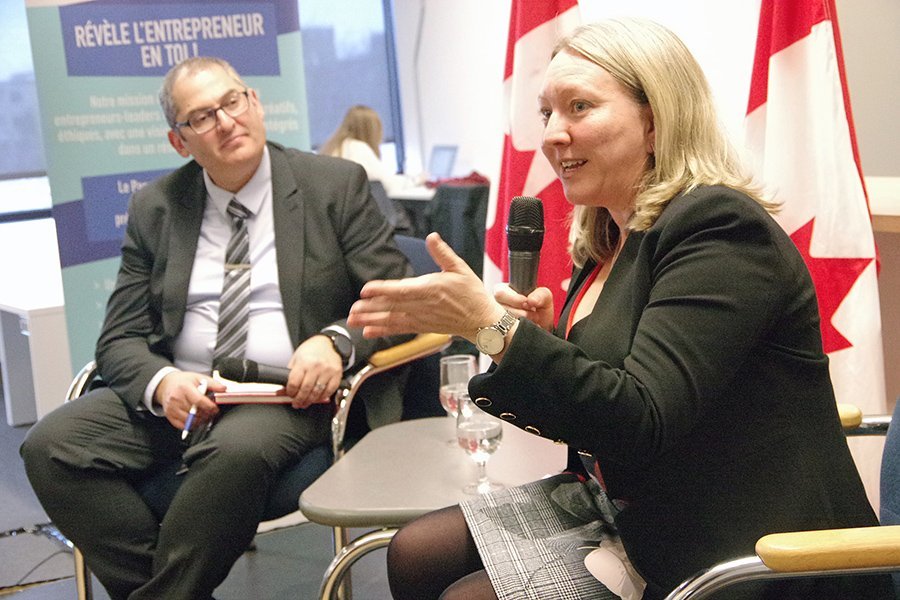
Martin C. Barry
After scarcely two months in the saddle, the country’s new Minister for Middle Class Prosperity wants Canadians to know there’s more to her cabinet posting than its name, which has drawn a fair amount of derision from the media since the day of her appointment.
First elected MP for the riding of Ottawa-Vanier in a 2017 by-election, Mona Fortier was given her cabinet position by Prime Minister Justin Trudeau last fall following the 2019 general election.
Among other things, she has responsibility for fleshing out one of the key political catchphrases that has become an essential part of the Liberals’ terminology since Justin Trudeau first took the reins of power in 2015.
Met students at U of M
During a stop in Montreal last week during her first road trip as a cabinet minister, she addressed and held a pre-budget consultation with students and fledgling entrepreneurs at the University of Montreal’s École des hautes études commerciales.
“We have to go back four years ago when the government was first elected in 2015 and realized it was important to continue to strengthen the middle-class,” Fortier said in an interview with Newsfirst Multimedia. “Now we also know that Canadians are feeling the squeeze of costs and income not rising fast enough.
Tasked by the PM
“So the Prime Minister has asked me to look at how we can make sure that we have sound decisions on quality of life measures, affordability measures, to make sure that Canadians continue to grow the middle class, but at the same time they know that they can have access to affordable housing, they can pay their education or their kids’ education and put money aside to have a secure and dignified retirement.”
Fortier is the first female Member of Parliament for Ottawa-Vanier. Prior to being elected, she worked as the chief director of communications and market development at Collège La Cité in Ottawa, and managed her own strategic communications consulting firm.

Believes in bilingualism
Fortier has also served on several non-profit boards of directors, including the Montfort Hospital, the Ontario Provincial Advisory Committee on Francophone Affairs and the Shaw Centre.
At the same time, she has shown herself to be a strong advocate for bilingualism. Francophones continue to make up a large segment of the population in her home riding. She is a mother of three, a believer in entrepreneurialism and a University of Ottawa graduate.
While a good number of journalists reacting to Fortier’s appointment said they were mystified as to what practical purpose the new ministry would serve, a mandate letter issued by Prime Minister Justin Trudeau spelled out fairly clearly what her responsibilities are.
Cross-government mandate
“You will develop cross-government approaches to ensure that the prosperity and quality of life of the middle class are central to government policy-making,” Trudeau said, suggesting that Fortier will be expected to act as a bridge to other key federal ministries, even though her status is that of a second minister within the Department of Finance.
In Fortier’s own words, “I will be working closely with Finance Minister Morneau who has to make sure that we continue to have a strong economy. I will support those initiatives on a cross-governmental basis to make sure that affordability and quality of life and even financial security are part of our decision-making.
“We have to look at cross or pan-governmental programs and policies to make sure that we engage with my different colleagues around the cabinet table to make decisions,” she said.

Building on job description
When asked by Newsfirst Multimedia to expand on the Prime Minister’s job description, Fortier added, “I think the most important thing for me, in addition to listening to Canadians, is that I will be building that job description by working with my colleagues and also pressing on making sound decisions so that we can continue to grow the middle class and strengthen our economy.”
Fortier was also asked how she reacts to critics who have observed that her ministry appears limited in scope and its name seems only to reflect a basic precept from the original Trudeau Liberal agenda, which has degenerated into somewhat of a cliché.
What Canadians are living
“I believe it is a reality that we live across the country,” she said. “And we have to look at it in a positive way where we’re really looking at what Canadians are living and feeling, and day-to-day families what they need to continue to contribute to our economy.
“Let’s make sure we find the right ways to help people that are maybe having struggles and that are living in poverty situations,” she continued.
“We need to find those programs and measures to bring them to be able to join the middle-class. And for me that’s what’s important. We want all Canadians to succeed and to prosper. And that’s my objective: to find ways to make sure that we do that.”



